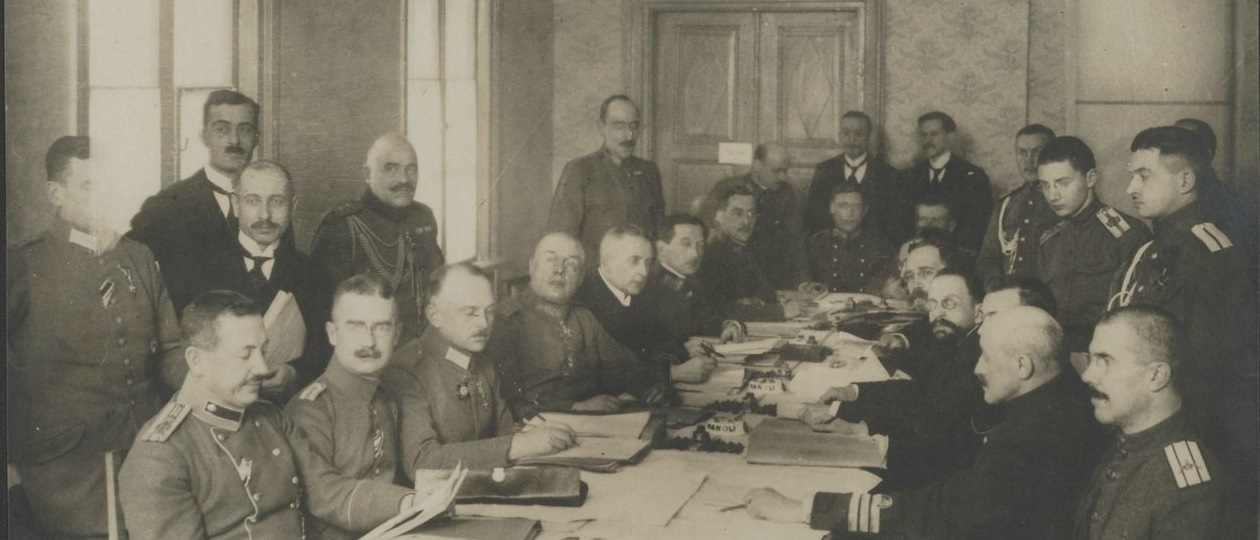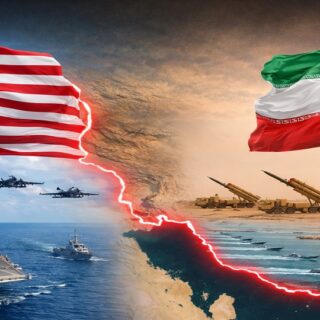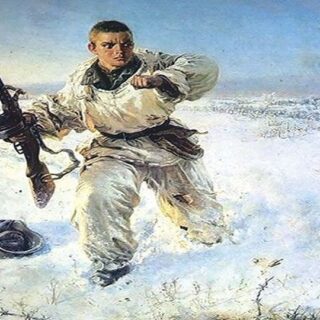
Today we’re talking with a historian Yuri Bahurin, the author of “Front and Rear of the Great War”.
1) Why did you decide to deal with the First World War?
Having entered the history department, I really didn’t immediately understand for myself and decided what kind of historical epoch most attracted to me: here you have the incomprehensible Middle Ages and the Napoleonic Wars … Actually, the first “serious” history books I acquired to earn an honest salary after the summer in the repair team at the school, began the “Epoch of the Crusades” edited by Ernest Lavis and Alfred Rambo and a collection of essays “Napoleonic Wars. What if?..”, published in Russian in the legendary series “Military Historical Library”.
And then he found a passe-partout in the family archive — a photograph of his great-grandfather with fellow soldiers. Being still not well-versed in the history of the uniform of the Russian Imperial Army, and of World War I as a whole, I decided to seek the help of excellent specialists in it at the Internet forum “The Great War 1914-1917”. Colleagues examined the photo scan, noted: the guns on the ropes, the guns on the shoulder straps are gunners, and the encryption (letter “H” — “N” in Russian) also visible on shoulder straps — this means Novogeorgievskaya fortress artillery. It became equally interesting and shameful — I only heard something about the Novogeorgievsk fortress. This knowledge gap had to be filled, but in the process so much new was discovered (for me) … As a result, photography became a thread that connected with the history of the Great War. The final qualifying work about Novogeorgievsk formed the basis of my first book, becoming, in fact, the first separate study of the history of this fortress in Russian in general. In a new book, I devoted one of the chapters to the same topic, with the involvement of some new sources.
2) What is the main difference for you not from the Great Patriotic War, but from the Second World War?
I think the fundamental difference here lies precisely in the fact that the First World War was… the first. The first is very much: in the unprecedented scope, the intensity of military operations, the mass of existing armies and the losses that they suffered, in the breadth of the use of military equipment, the introduction of advanced achievements of science and engineering in military affairs. In a number of domestic political decisions in the participating countries of the First World War, at least take the evacuation of the civilian population of the front line, and along with it mass evictions based on nationality or religion (the bill went to hundreds of thousands of people). Not everything in 1914-1918 appeared for the first time. Years and decades before, mankind climbed step by step on the stairs to heaven, and then found itself beyond the threshold of the underworld. Where they do not “rush, crack, the airplanes of the brave to fabulous countries” as once wrote a Russian poet — Severyanin, but conduct air reconnaissance, bombardment from the air and sowing of metal arrows on the infantrymen’s heads on the march — aviation began to be used much more actively than during the Balkan wars. Where the chemistry in the person of Fritz Haber not only saved entire generations from hunger by giving them nitrogen fertilizers, but also brought chemical weapons to the battlefield. This listing of examples may be lengthy.
So, by the beginning of World War II, all this, and much more, was no new thing for the world. The Great War gave all its participants colossal experience, mastered, developed over the next two decades, and also — saved mankind from the illusion that the good old world can be preserved or restored along with the “lost generation”.
3) What is the most important myth of the First World War?
Without pretending to be absolutely right, I will name as such, as applied to Russia, the notorious “forgottenness” of the First World War. Sometimes, reasoning that the Great War is a forgotten war even seems ritual, especially if this amnesia of a national scale is associated with the Soviet period of Russian history. I would like to ask those complaining about this: what prevents you from remembering it today, starting from yourself, of course? In recent decades, quite a lot of literature has been published, including the rarest sources, hundreds of gigabytes of photocopies of archival documents are presented on the Internet – just reach out to them. And even if we talk about the USSR, then – yes, of course, the cult of memory of the First World War, its heroes, who were sacrificed during it, did not arise in Soviet society. And – yes, tens of thousands of names, alas, have sunk into oblivion. However, at the same time, to call unconsciousness the study of the vast experience of war that was conducted in the Soviet Union right up to the Great Patriotic War is incorrect and unfair. It was then, in the interwar years, that the First World War was or was considered unjust, imperialistic, whatever, but not forgotten. Evidence of this can serve as thousands of books and articles published in those years both in the USSR and in Russian Abroad.
4) Could it have ended differently?
I can even assume that it might have not started at all! For example, Kaiser Wilhelm II would finally abandon geopolitical claims by right of power. After all, the German General Staff, since 1888, advocated the outbreak of a preventive war in Europe, and the emperor looked into this abyss and recoiled from it in horror.
Although unlikely, the Second Reich was preparing for war, not peace. Perhaps the leading world powers would support the peacemaking initiative of Emperor Nicholas II, embodied in the Hague Conference of 1899? It is hardly possible, given that Russia had a completely trivial reason for this: the need to close the gap between potential rivals and allies in military-technical terms. And the Russian Empire itself, of course, was in no hurry to disarm in the armed world, having launched the “Great Program to Strengthen the Russian Army.” But what if French children began to display the words “Alsace — German land?” to the joy of teachers? Unlikely. Would London wave its hand at the Baghdad Railway? Vienna and Istanbul to the Balkans? I doubt it. Stone peacefulness does not come out.
But seriously, the variability of the past is a question, rather, from the field of philosophy at best, and at worst journalism of varying degrees of quality. And it’s too tempting to answer this question as “the heart is broadcasting”, to find explanations for Russia’s defeat in the war easier or, on the contrary, more productive, to grieve lightly about the “frustrated triumph”, etc. Such mental exercises do not repel me, but just seem boring. The First World War was not an accident either at the beginning or at the end.
5) Brest-Litovsk peace treaty — betrayal or necessity?
Oh, how to look: those who considered the incident as treason then were probably quite sincere, especially the officers who had gone through the crucible of war. On the other hand, the same Bolsheviks and their leaders did not promise Russia and the Russian army victory in the war, but the promise to leave which provided the Bolshevik party with broad support both at the front and in the rear. If they promised, and then deceived, then they could rightfully be called traitors. Objectively, a striking illustration and at the same time the answer to this question can serve as the background to the signing of the Brest Peace, namely the events in northwestern Russia at the end of February 1918 — clashes with German troops. Today, in disputes about February 23, how this holiday is generally historically justified, the heroic or shameful is a page in the history of Russia and so on, spears continue to break. Last year, on the occasion of the centenary of the Red Army, I wrote a review article about this. And now I can only repeat myself: on February 23, historically, it can be considered a significant date in the history of the First World War II and the Fatherland as a whole, if only because there and then they tried to repulse the enemy both the soldiers of the old Russian and the soldiers of the new, Red Army. How successful this attempt was is another matter. But if we accept the fact that February 23 clearly demonstrated the degree of combat readiness of the armed forces that Russia possessed, it should be recognized that neither their impulse was a shameful escape, nor the signing of the Brest-Litovsk peace treaty was a cynical act of betrayal of Russia and its interests.





